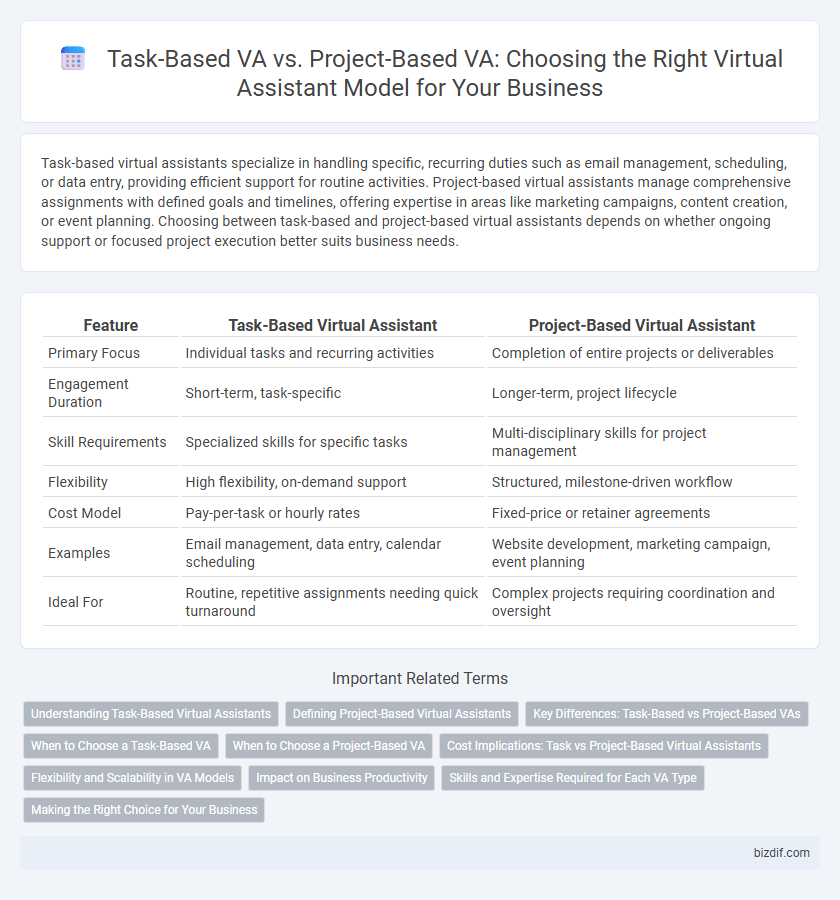Task-based virtual assistants specialize in handling specific, recurring duties such as email management, scheduling, or data entry, providing efficient support for routine activities. Project-based virtual assistants manage comprehensive assignments with defined goals and timelines, offering expertise in areas like marketing campaigns, content creation, or event planning. Choosing between task-based and project-based virtual assistants depends on whether ongoing support or focused project execution better suits business needs.
Table of Comparison
| Feature | Task-Based Virtual Assistant | Project-Based Virtual Assistant |
|---|---|---|
| Primary Focus | Individual tasks and recurring activities | Completion of entire projects or deliverables |
| Engagement Duration | Short-term, task-specific | Longer-term, project lifecycle |
| Skill Requirements | Specialized skills for specific tasks | Multi-disciplinary skills for project management |
| Flexibility | High flexibility, on-demand support | Structured, milestone-driven workflow |
| Cost Model | Pay-per-task or hourly rates | Fixed-price or retainer agreements |
| Examples | Email management, data entry, calendar scheduling | Website development, marketing campaign, event planning |
| Ideal For | Routine, repetitive assignments needing quick turnaround | Complex projects requiring coordination and oversight |
Understanding Task-Based Virtual Assistants
Task-based virtual assistants specialize in handling specific, recurring tasks such as email management, calendar scheduling, or data entry, enabling businesses to streamline daily operations efficiently. Their expertise allows them to perform these functions quickly and with high accuracy, reducing the workload on in-house staff. Companies benefit from task-based VAs by gaining flexible support tailored to routine needs without the commitment of managing entire projects.
Defining Project-Based Virtual Assistants
Project-based virtual assistants specialize in managing specific assignments with clear objectives and deadlines, offering expertise tailored to complex or one-time projects such as website development, event planning, or marketing campaigns. Their work scope is defined by project requirements, delivering comprehensive solutions from initiation to completion. This focused approach enables efficient resource allocation and measurable outcomes compared to the ongoing support provided by task-based virtual assistants.
Key Differences: Task-Based vs Project-Based VAs
Task-based virtual assistants handle specific, repetitive duties such as email management, scheduling, or data entry, allowing businesses to offload routine tasks efficiently. Project-based virtual assistants manage entire projects or complex workflows with clear goals and deadlines, providing strategic support and specialized skills tailored to project requirements. The key difference lies in task scope and duration: task-based VAs focus on discrete, ongoing activities, while project-based VAs deliver comprehensive solutions over defined periods.
When to Choose a Task-Based VA
Task-based virtual assistants are ideal when you need help with repetitive, ongoing tasks such as email management, data entry, or scheduling. They offer efficiency and consistency for short-term or daily operations without the complexity of full project management. Choose a task-based VA when your focus is on routine activities that require quick turnaround and specialized skills.
When to Choose a Project-Based VA
Choose a project-based virtual assistant for tasks that require specialized skills, defined deliverables, and a clear timeline. This option suits businesses aiming to complete specific projects such as website development, marketing campaigns, or event planning. Project-based VAs offer focused expertise and accountability, ensuring efficient project completion within budget and deadlines.
Cost Implications: Task vs Project-Based Virtual Assistants
Task-based virtual assistants typically charge hourly or per task, offering cost efficiency for repetitive, short-term duties, whereas project-based virtual assistants often provide fixed pricing tailored to the entire project's scope, ensuring budget predictability for complex assignments. Businesses save money with task-based VAs when handling ongoing, smaller workloads, while project-based VAs reduce financial risk by delivering comprehensive solutions with clear deliverables. Evaluating the nature of work and long-term needs is crucial to optimize virtual assistant costs and maximize return on investment.
Flexibility and Scalability in VA Models
Task-based virtual assistants offer high flexibility by handling specific, recurring duties with adaptable scheduling, making them ideal for dynamic workloads. Project-based virtual assistants provide scalability through focused expertise on defined projects, enabling businesses to manage resources efficiently during intensive periods. Selecting the right VA model depends on balancing ongoing task management with the need to scale support for complex initiatives.
Impact on Business Productivity
Task-based virtual assistants streamline daily operations by handling repetitive activities like scheduling and email management, allowing businesses to focus on core functions and increase efficiency. Project-based virtual assistants contribute to significant business growth by managing entire projects, from planning to execution, ensuring deadlines are met and resources are optimized. Both approaches enhance business productivity by reducing workload and improving time management, but project-based VAs offer a more strategic impact through comprehensive project oversight.
Skills and Expertise Required for Each VA Type
Task-based virtual assistants require proficiency in specific, routine tasks such as email management, scheduling, or data entry, emphasizing efficiency and accuracy in repetitive duties. Project-based virtual assistants need advanced skills in project management, communication, and specialized knowledge relevant to the project's domain, enabling them to handle complex, time-bound deliverables. Expertise in software tools like Asana or Trello is crucial for project-based VAs, while task-based VAs benefit from mastery of productivity tools like Microsoft Office or Google Workspace.
Making the Right Choice for Your Business
Task-based virtual assistants specialize in handling specific, repetitive duties such as email management or scheduling, boosting efficiency in daily operations. Project-based virtual assistants offer expertise for broader, short-term initiatives like website development or marketing campaigns, providing strategic support with defined deliverables. Selecting the right virtual assistant depends on business needs: task-based VA suits ongoing routine work, while project-based VA fits specialized projects requiring focused skills.
Task-based VA vs Project-based VA Infographic

 bizdif.com
bizdif.com